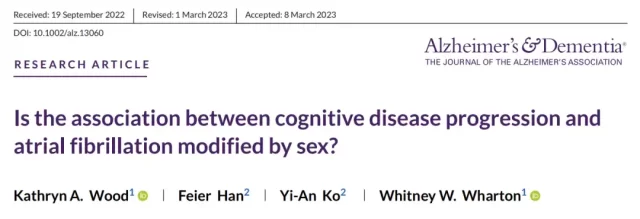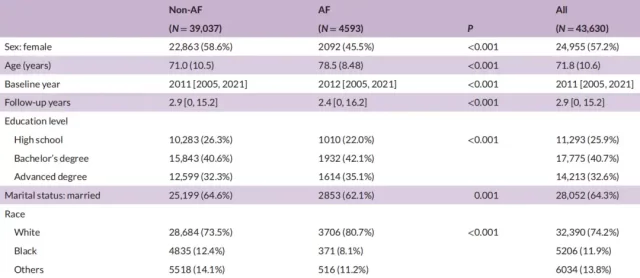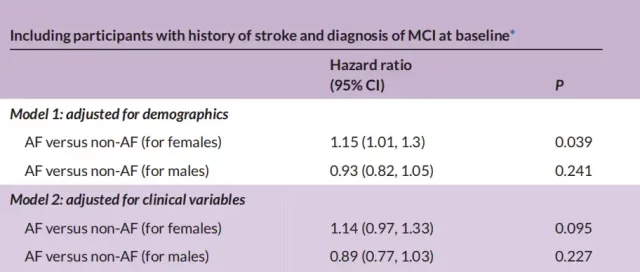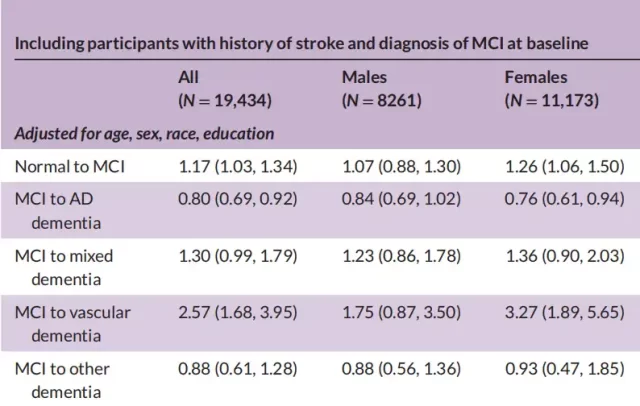Atrial fibrillation is linked to 200% higher risk of dementia in women
- Normal Liver Cells Found to Promote Cancer Metastasis to the Liver
- Nearly 80% Complete Remission: Breakthrough in ADC Anti-Tumor Treatment
- Vaccination Against Common Diseases May Prevent Dementia!
- New Alzheimer’s Disease (AD) Diagnosis and Staging Criteria
- Breakthrough in Alzheimer’s Disease: New Nasal Spray Halts Cognitive Decline by Targeting Toxic Protein
- Can the Tap Water at the Paris Olympics be Drunk Directly?
Scientists find for the first time that atrial fibrillation is linked to 200% higher risk of dementia in women
- Should China be held legally responsible for the US’s $18 trillion COVID losses?
- CT Radiation Exposure Linked to Blood Cancer in Children and Adolescents
- FDA has mandated a top-level black box warning for all marketed CAR-T therapies
- Can people with high blood pressure eat peanuts?
- What is the difference between dopamine and dobutamine?
- How long can the patient live after heart stent surgery?
AD: Scientists find for the first time that atrial fibrillation is linked to 200% higher risk of dementia in women。
We know that cardiac arrhythmias are associated with an increased risk of dementia, with atrial fibrillation being the most common sustained cardiac arrhythmia.
With the increase of aging, the number of elderly patients with atrial fibrillation and dementia will increase.
Previous studies have shown that atrial fibrillation is an independent risk factor for mild cognitive impairment (MCI) and Alzheimer’s disease and related dementias (ADRD).
Compared with men, women with atrial fibrillation usually have a worse prognosis, and women are at higher risk of MCI and ADRD than men, but studies have also found that women aged 65 to 79 do not have AF-related MCI events. So is there a gender difference in the risk of atrial fibrillation-related MCI/ADRD?
Recently, the team of Kathryn A. Wood from Emory University School of Nursing discussed the above issues.
They analyzed data from a National Alzheimer’s Coordinating Center (NACC) cohort of 43,630 participants and found that the impact of atrial fibrillation on cognitive function was different between women and men, and that women with atrial fibrillation had cognitive The rate of decline in function is faster .
Specifically, women with AF had a higher risk of developing MCI (OR=3.43, P=0.002) and dementia (OR=3.00, P=0.017) than women without AF, whereas women with AF The ORs for the risk of MCI and dementia in men were only 1.73 and 2.60.
In addition, compared with women without AF, women with AF but with normal baseline cognitive function had a higher risk of disease progression from normal to MCI and from MCI to vascular dementia (HR, 1.26 and 3.27, respectively). .
This is also the first study to use multicenter, large-sample data to assess risk and gender differences in atrial fibrillation-related cognitive impairment and dementia. Research published in Alzheimer ‘s & Dementia .

Screenshot of paper home page
The NACC database covers data from Alzheimer’s Disease Research Centers (ADRCs) in more than 40 cities in the United States. It is currently one of the largest and most comprehensive Alzheimer’s disease-related databases in the world.
The study finally included the data of 43,630 participants in the NACC database as of March 2021. Among them, there were 4,593 patients with atrial fibrillation at baseline, the average age was 78.5 years, 46% were women, and the median follow-up time was about 4 years .
All participants were enrolled in at least three outpatient clinic visits per year during which they underwent psychometric testing and were categorized as normal cognition, MCI, and dementia.

Patient Baseline Data
After assessing the impact of AF and sex differences on cognitive function, the researchers found that women with AF had an increased risk of MCI (OR=3.43, P=0.002) and dementia compared with women without AF higher (OR=3.00, P=0.017) ; compared with men without AF, the odds ratios for the risk of MCI and dementia in men with AF were 1.73 and 2.60 (not statistically significant). This also means that women with AF are more likely to have MCI/dementia than men.

Effects of atrial fibrillation and gender differences on cognitive function
In order to further understand the impact of atrial fibrillation on the progression of cognitive function disease, the study also performed a survival analysis, including 13683 participants.
During the median follow-up of 4 years, 30% of the participants had worsening cognitive dysfunction, 21 % of participants developed dementia.
After adjusting for demographic variables, AF was associated with faster disease progression in women (HR = 1.15) compared with men (HR = 0.93).
After adjusting for clinical variables, the correlation between the two was no longer significant.

The impact of atrial fibrillation on the progression of cognitive disease
Next, the researchers also analyzed the relationship between atrial fibrillation and the risk of different types of dementia, and found that after adjusting for age and race, compared with women without atrial fibrillation, women with atrial fibrillation and baseline cognitive function Normal women had a higher risk of progression from normal cognition to MCI (HR = 1.26) and progression from MCI to vascular dementia (HR = 3.27).
This suggests that in cognitively normal women, AF is significantly associated with the rate of disease progression.

Association between atrial fibrillation and risk of different types of dementia
Finally, because the NACC data did not record the sequence of stroke and atrial fibrillation, participants with a history of stroke or MCI at baseline were at higher risk of developing dementia in the future. A subgroup analysis was performed, excluding participants who had stroke or MCI at baseline.
AF was associated with faster disease progression in women (HR = 1.20) compared with men (HR = 0.97) after adjusting for demographic variables, and the association between the two was also smaller after adjusting for clinical variables up.

Results of subgroup analysis
In conclusion, this is the first study to examine sex differences in the progression of AF-related cognitive disease. In the original analysis, the researchers found that women with atrial fibrillation had a higher risk of MCI/dementia and a faster rate of disease progression.
Finding ways to identify patients with AF who are at highest risk of cognitive decline and to intervene early in these patients could prevent or slow down AF-related MCI and dementia-related diseases in the future.
references:
[1]Wood, KA, Han, F, Ko, YA, Wharton, WW. Is the association between cognitive disease progression and atrial fibrillation modified by sex?. Alzheimer’s Dement. 2023; 1- 11.
Scientists find for the first time that atrial fibrillation is linked to 200% higher risk of dementia in women
(source:internet, reference only)
Disclaimer of medicaltrend.org
Important Note: The information provided is for informational purposes only and should not be considered as medical advice.



